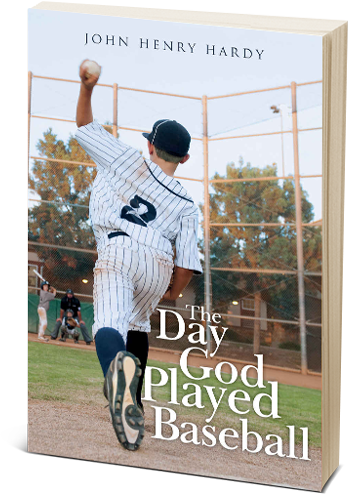
Hardy (When Brothers Meet, 2017, etc.) tells the story of a small, baseball-loving town in Pennsylvania as it prepares for the annual league championship game–but the rivalry between two teams goes much deeper than friendly competition.
Alex Sardinski, the chief loan officer at the only bank in Pineville, loves two things: baseball and his fiancée, Candy Hollis, a teller where he works. As he prepares for another shot at the championship and a future with Candy, his life seems perfect. Little does he know that farm-equipment business owner Conrad Beamis has a vendetta against him for not approving a business loan two years earlier. Step by step, Conrad sets out to exact his revenge on Alex by taking away what he loves most: first, his relationship with Candy and then the baseball championship. The couple starts having difficulties after Conrad hires Candy as his personal assistant, and a championship for Alex’s Cherokees feels impossible– the business tycoon stacks the Creeks team, and even the umpires work for him. Then a strange boy named Timmy joins the Cherokees for their final game against the Creeks. The baseball diamond becomes a place of transformation, justice, and the supernatural in a comedic romp of a finale. If this book’s antagonist sounds a bit overly diabolical for the context, that’s because he is; indeed, the devilish Conrad comes off as something of a mustache-twirling villain. In contrast, the main character, Alex, is likable though a little bland–somewhat like the story’s small-town setting. Those looking for a simple, somewhat predictable story of an underdog team will enjoy the outcome, however. There are some touching moments, as when Conrad’s autistic son, Ray, gets his first-ever baseball hit. A lot of paranormal occurrences during the game simultaneously amuse the crowd and teach lessons about cheating, fair play, and overall goodness.
A nostalgic, heartwarming look at small-town baseball, but its scheming villain can make it difficult to take seriously at times. A great read!!
By: John Henry Hardy
Publisher: CreateSpace Publication
Date: September 2017
ISBN: 978-1973953814
Reviewed by: Barbara Bamberger Scott
Review Date: March 25, 2018
If a baseball team ever needed help, it is today; yet somehow Alex Sardinski suspects that a savior is out there, as the Cherokees, the youth baseball team he coaches, battles it out with their biggest rivals, the Creeks.
Sardinski, a banker in the tiny town of Pineville, PA, has coached the Cherokees for fourteen years. His passion for the sport, his willingness to play fair, his openness to take both boys and girls for the team, are all part of who he is. Another important piece of Sardinski’s character of late has been his loving feelings for Candy Hollis, who works in the bank. Alex has even found a nice little house for sale that they can just afford. It all seems like a dream coming true. But there is a force of evil in Pineville – Conrad Beamis, who owns the only big business in town, a textile mill, and supports the Creeks. Beamis is enraged at Sardinski for refusing to recommend him for a loan, and schemes revenge. He recruits big, rough boys, secretly too old for the team, and has the umpires in his pocket, folks who won’t defy Beamis for fear of losing their jobs. But worse, he courts Candy, offering her a big salary to be his personal secretary.
By the day of the championship game, Beamis is crowing and Sardinski is sweating. But Sardinski has a secret weapon, a small, energetic kid named Timmy, newly recruited as a pitcher. Timmy and his mother Maria seem to have come from out of nowhere, yet know all about the love lorn banker even without being told. As the big game looks lost, 6-0 in favor of the Creeks, Timmy starts displaying his remarkable, almost supernatural skills, and things slowly turn around.
Author, businessman and former Marine Hardy (Whisper in My Ear, The Place Where the Giant Fell, When Brothers Meet) has created a magical mystery combining the excitement of a kid’s baseball championship with the course of a true love derailed and a serious adult rivalry that threatens an entire community. His writing shows an enjoyment of simple, hometown humor and empathy for young people and their activities. But there is something else, an unusual element crucial to the story: embedded in this small-town sports saga is a spiritual parable. Hardy skillfully insinuates the religious aspect revealed in the book’s title into a fast-paced, amusing, romantic story that has the power to charm readers of all ages.
Quill says: Hardy’s page-turner plot could make an excellent focus for family religious study, and will appeal to baseball fans for the many small touches that indicate an insider’s expertise about the game.
Amazon's customer review...
(5) Star![]()
Awesome Awesome Book!!
This book had me laughing. A nine year old boy is God’s instrument in teaching a rude and no good business owner that cheating will have it’s consequences in a ballgame you’ll never forget. Conrad, the business owner treats his employees like crap and uses them to cheat and make bad calls when Timmy, the opposing pitcher gives them an afternoon of their own medicine that will have you laughing and wanting more. Another great book from John Henry Hardy! He keeps you intrigued and laughing throughout the entire game. Awesome book!
(5) Star![]()
Really enjoyed reading with my son
Really great baseball story I was able to read with my son. We both love baseball and this was a great tale with some interesting tangents to make you thank about life. Great read!
